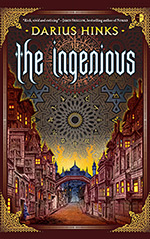
![]() Arifel
Arifel
1/2/2020
![]()
The Ingenious never quite capitalises on the promise of its worldbuilding, but it offers a fun, fast-paced adventure with a surprisingly sympathetic antihero.
I'm considering adding "secondary world fantasy cities" to my list of "favourite genres that aren't really genres". Cities that go beyond just being a spot on the map surrounding whatever medieval-ish castle the kingdom's monarchs live in; cities with their own magic, with recognisable neighbourhoods, with immigration patterns and multifaceted politics and secrets known only to kids who pay attention (but don't spend enough time in school). From Bulikov to Sharakhai to Janloon, there's a ton of great epic fantasy whose urban settings are just as much characters as the people within them.
With that in mind, it's easy to see why the blurb of The Ingenious, a book about Exiles trapped in the city of Athanor. Unfortunately for them, Athanor operates on inequality and deeply creepy magic, and leaving is a far from certain proposition. Rather than staying in one place, it moves through space and time using that magic, apparently leaving a path of wholesale slaughter and destruction everywhere it goes. Brought into the city years ago, Isten and her group are Exiles from a land called Rukon, where they were on the verge of revolution against their emperor. Now, they're unable to leave the city let alone return to the land which rejected them. Isten herself has been raised up to be a saviour for her people, and is still looked to as a leader by the rest of the Exiles despite being an addict, a criminal and a general mess of a human.
Enter Alzen, an elite mage (or "Curious Man") who, even by the deeply creepy standards of the city, really pushes creepy to a new, murderous, self-serving level. Alzen realises that Isten can be manipulated to his own ends, which involve introducing widespread drug addiction into the city and then pulling people's souls out through a weird skin monster, all in pursuit of power. Although his partnership with Isten is initially reluctant, he quickly discovers that despite being a commoner and an outsider, Isten may have power of her own that complements his ambitions. In return, Alzen offers Isten a chance to refocus her people's efforts around improving their position within the city - where they are outsiders surviving on the criminal margins - albeit at the cost of her long-term plans for escape.
I see from Hinks' bibliography that his previous work has been Warhammer tie-in fiction, and although my experience with that franchise is limited, I know enough to see the influences here. It's echoed in some of the plot beats, and in the grimdark elements of the setting, especially the ageless, quasi-religious aspects of the city's leadership. That said, The Ingenious definitely feels first and foremost like its own thing, though the worldbuilding is probably best described as serviceable: it gives Athanor depth and history, and the set-up of the Curious Men and the city's wandering nature adds a decent amount of novelty, but there's nothing that really leaps out upon reading. In theory, Athanor is full of various unique fantasy races, but these only turn up in passing, which feels like a missed opportunity. Instead, we get a laser focus on the two specific groups the novel comes into contact with - the exiles and the Curious Men - and while both do interact with (and sometimes murder) people from other groups in the city, the trials of the rest of this enormous city aren't explored outside a general "inequality is bad, overthrow tyrants" message that winds up being interchangeable for both Rukon and Athanor.
http://www.nerds-feather.com/2019/03/microreview-book-ingenious-by-darius.html